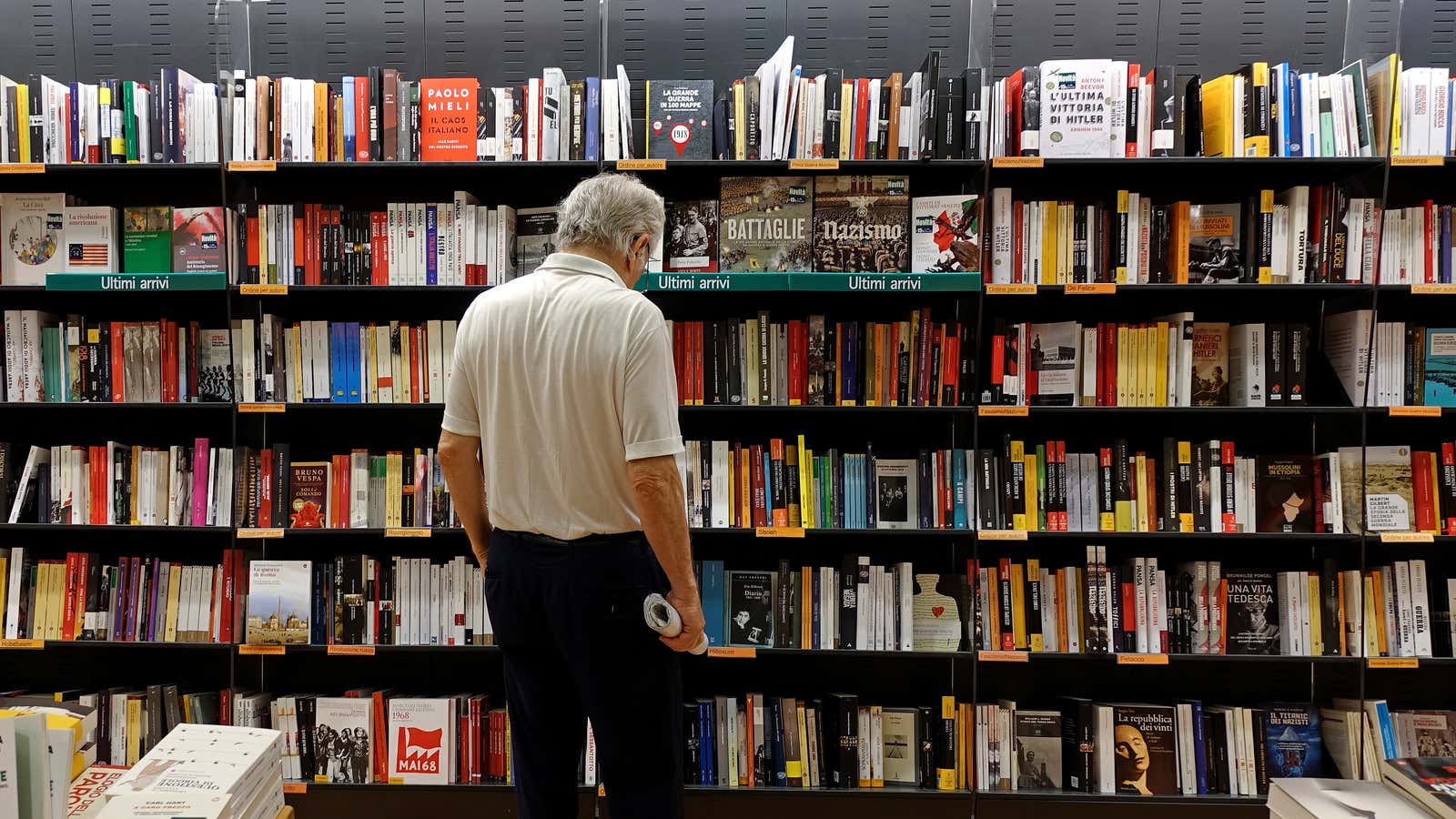After experiencing a severe coronavirus outbreak—with almost 170,000 people infected and more than 22,000 killed—things have started to improve in Italy over the past couple of weeks. It recorded its lowest number of new cases in one month earlier this week.
The government has now started to ease its strict lockdown measures. It has allowed some businesses to reopen, including bookstores, which are now having to figure out how to reignite their operations and start welcoming customers again.
China is the only country that had as severe an outbreak as Italy, managed to control it, and is now trying to reopen. China’s main lesson might be that the behaviors that businesses need to protect against are so omnipresent—being together, breathing, touching things—that changes are radical.
Restaurants might be forced to add plexiglass walls between tables, cinemas might have to block every other seat, beauty shops might have to eliminate sample tables.
Back to business
Here in Italy, all four major bookstore chains are being cautious. Only one, Libraccio, reopened some of its stores on Tuesday (April 14), the first day it was allowed. The others, Mondadori, Giunti, and Feltrinelli, chose to wait, and will start reopening stores in the coming days and weeks.
There are also different rules in different regions. Here in Lombardy, the epicenter of the epidemic, authorities have forbidden bookstores from reopening. Lazio, the region that contains Rome, set a different date than the national government.
All chains are deep cleaning their stores before welcoming customers, and are planning to increase the number of cleaning shifts during commercial hours. Feltrinelli, Libraccio, and Giunti will make staff wear face masks, and provide them for customers if needed. Some will also provide disposable gloves and hand gels.
Feltrinelli will add plexiglass sheets to checkouts. “We are also evaluating measuring the temperature of customers at the entrance of the bookshops,” said chief operating officer Alberto Rivolta.
These chains, which operate hundreds of shops across Italy, often have large spaces, which make it easier to respect social distancing rules. Giunti said it will guarantee that clients and customers stay far apart, while Mondadori will rethink the size of its bookcases and their position to create more open space. But social distancing will be harder to enforce in smaller spaces, like in many independent bookstores.
The government said any activity inside the shops that reopen must be reduced to essentials, and that clients shouldn’t remain inside a store for longer than necessary to purchase a product. For bookshops, that means that customers will not be as free to roam between shelves or to browse books as before. Libraccio says that they will have to use gloves.
All of this means more planning, more work, and more spending. And it might also mean improvising, daily, new measures to keep staff and customers safe. “The rules for the world to come,” as summarized Federico Rampini, a business columnist at Repubblica.
Then there is everything else
As outbreaks subside, Italy and other countries in Europe are gradually allowing more types of businesses to reopen—from DIY shops in Austria, to farmers markets in Bulgaria, to hairdressers in Norway. For each one of them there will be different safety considerations.
Then there are manufacturers. Here in Italy, unions are demanding safety measures from Fiat. They want the company to move machines around and add markings to the floor so workers can keep a safe distance. They also want it to allow workers to skip lunch and leave early to eat at home instead of in crowded canteens.
Ferrari hired virologists to help it create its back-to-work plan, which will include an app that both informs and tracks workers for contact tracing, and optional Covid-19 blood tests for factory workers and their families. It even gave it a catchy name—the Back on Track plan.
Where are the readers?
One question now is what Italians will be buying once they’re inside—beyond the books about the pandemic, which are already being written here. If the current bestseller charts are any sign, they will be looking for interminable book series to entertain their children, like the Harry Potter series, and themselves, with the Neapolitan tetralogy by Elena Ferrante.
Some will be looking for an immersion in the world of infectious disease, with Albert Camus’ Plague and José Saramago’s Blindness, while others, also based on the current rankings, will use the detective stories of Michael Connelly, Carlo Lucarelli, and Georges Simenon to find a escape.
